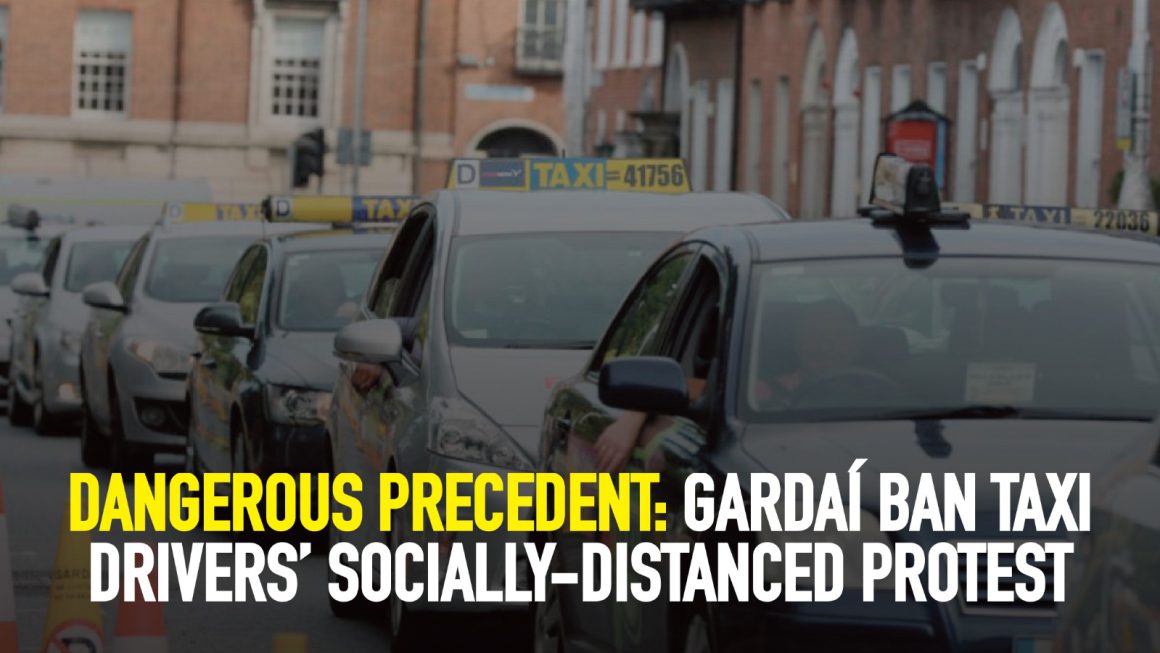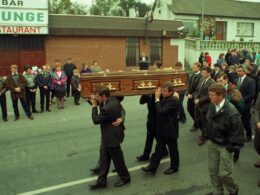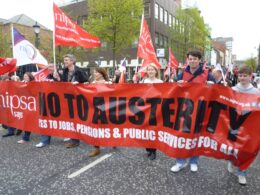By Brian McCarthy
Gardaí have banned a taxi drivers’ protest which was planned for Thursday 29 April, using public health grounds as a pretext. This is despite the fact that the drivers would have remained in their cars, minimising any potential public health risk. The protest was to demand government support for drivers, many of whom have been devastated during this crisis.
In the wake of the taxi drivers’ controversy the Gardaí have said, “To be clear, and as stated publicly on multiple occasions, An Garda Síochána has no role in licensing or approving protests. In other words, An Garda Síochána cannot ban protests.” However, organisers with taxi drivers’ group, Tiomanai Tacsaí, claim that Gardaí planned to issue €100 fines, which could affect their PSV license renewals.
If this was a single incident, that would be cause enough for serious concern. However, this is part of a pattern of attacks on civil liberties and the right to protest during Covid restrictions.
One law for the rich, another for the poor
On the night of Thursday 22 April a serious escalation occurred in the long-running Debenhams dispute. The workers at the former store in Henry Street, Dublin, had placed a picket on the loading dock of the store to prevent the removal of stock by scab labour. Gardaí forcibly broke up the picket.
There were five Gardaí to each worker as they dragged them out of the way, making several arrests before escorting a truck through. Similar scenes have unfolded at former Debenhams stores in Tralee and Blanchardstown. The Gardaí, acting on behalf of liquidators KPMG, forcibly removed workers from the pickets and escorted scabs into the stores to perform non-essential work during Level 5 restrictions.
Other important protests have faced repression. Organisers for ROSA – Socialist Feminist Movement in Dublin had their details taken to be issued with fines for organising a protest against gender violence (which is also being exacerbated by Covid restrictions), following the murder of Sarah Everard. Again, these protests were outdoors, masked and socially distanced, and posed little if any risk to public health.
Here in Ireland as elsewhere, young people of colour were to the fore in organising BLM protests in the aftermath of the police killing of George Floyd in the U.S., which also highlighted the reality of racism in this society. Again these were outdoor events with social distancing and masks emphasised by all organisers. Stewards were on hand and measures were largely adhered to. Still, after a protest in Dublin, Gardaí launched a criminal investigation.
Repressive measures must be opposed
It is clear now that democratic rights, and particularly the right to protest, are under serious attack. The threat of fines, arrest, legal action or force can mean an effective ban on any protest, and the Gardaí have shown that they will follow through on those threats. This is why the Socialist Party, and our TD Mick Barry, opposed from the beginning the laws which gave the state these ‘emergency’ powers to ban protests.
The state has not stopped the non-essential stock removal by Debenhams, they have not sent the police in against meat factories and other employers who have flagantry endangered workers’ and public health during this crisis. The old adage of ‘one law for the rich and one law for the poor’ is clearly at play here as the Gardaí and the state have shown that they will not hesitate to deal violently with protesters and workers to facilitate the interests of the wealthy elite.
In a world in the throes of a pandemic, actively organising resistance to the inequalities and oppressions that are not only still present, but significantly worsened, is a more complicated issue. However, while health and safety must be a far greater consideration than ever before, the right to protest remains essential.
The recent repressive measures by the Gardaí represent an infringement on the basic right to protest and set a dangerous precedent. They must be opposed.












